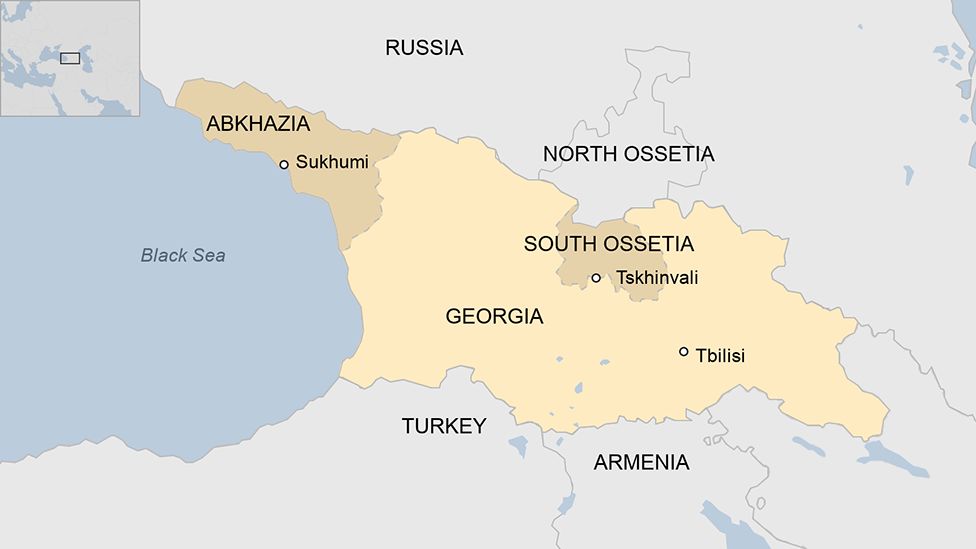Abkhazia profile
- Published

Situated in the north-western corner of Georgia with the Black Sea to the south-west and the Caucasus mountains and Russia to the north-east, Abkhazia was once known as a prime holiday destination for the Soviet elite.
The region fought and won a war of secession with Georgia in 1992-93, and formally declared independence in 1999. Its independence has gained little international recognition, most countries regard it as a part of Georgia.
After the Georgian-Russian war in 2008, Moscow recognized the region as an independent state. Georgia responded by declaring Abkhazia "occupied" by Russia.
Abkhazia's economy depends overwhelmingly on tourism from Russia and in recent years it has drifted closer to Russia. In 2009 Moscow signed a five-year agreement with Abkhazia to take formal control of its frontiers with Georgia proper, while in 2014 Russia and the region signed a "strategic partnership" agreement.
- Read more country profiles - Profiles by BBC Monitoring
ABKHAZIA: FACTS
- Capital: Sukhumi
- Area: 8,665 sq km
- Population: 244,000 (approximate)
- Languages: Abkhaz, Russian plus Georgian Mingrelian, Svan, Armenian, Ossetian
- Life expectancy: data unavailable
LEADER
President: Aslan Bzhania
Aslan Bzhania was elected with around 59% of the vote in Abkhazia's March 2020 presidential elections.
In December 2021 opposition protesters clashed with police in the capital Sukhumi. The opposition accused the authorities of failing to deal effectively with Covid-19 and of failing to manage Abkhazia's energy network properly.
MEDIA
Russian TV and Abkhazian state TV are the main sources of news. Major Russian stations are relayed in the territory. The only private TV, Abaza TV, is licensed to cover the entire region.
There is little or no access to Georgian TV, other than by satellite.
The Abkhaz government publishes newspapers in Abkhaz and Russian. Several private papers publish alongside official titles.
Internet usage is growing fast.
TIMELINE
Some key dates in Abkhazia's history:
756 - Independent kingdom formed.
985 - Becomes part of Georgia, later regaining independence.
1578 - Comes under Turkish rule.
1810 - Russia declares Abkhazia a protectorate.
1864 - Russia annexes Abkhazia.
1918 - Independent Georgian state - including Abkhazia - declared in wake of Russian Revolution.
1921 - Red Army invades, Georgia absorbed into emerging Soviet Union. Abkhazia becomes a separate soviet republic, with the ambiguous status of a treaty republic associated with the Georgian soviet republic.
1931 - Soviet authorities incorporate Abkhazia into Georgia.
1991 - Georgia declares independence.
1992-93 - Georgia-Abkhazia War: Georgia sends troops to Abkhazia to halt moves for secession. Fierce fighting ends with Georgian forces being expelled from Abkhazia. Up to 30,000 people are killed. Before the war Georgians make up nearly half of Abkhazia's population, but up to 250,000 Georgians and others are expelled, virtually halving Abkhazia's population.
1994 - Ceasefire agreed, peacekeepers arrive, nearly all Russian.
1999 - Abkhazia declares independence. Few countries recognise this.
2008 - As war between Russian and Georgian forces breaks out in South Ossetia, Abkhaz forces clash with Georgian troops in the Kodori Gorge in Abkhazia. Russia sends in troops to support the Abkhazians. Georgian forces and civilians evacuate the last part of Abkhazia under Georgian government control
Russia formally recognises Abkhazia's independence, following the Russian-Georgian war over South Ossetia.
2014 - Russia and Abkhazia sign a "strategic partnership" agreement. Georgia accuses Moscow of seeking to annex Abkhazia.
2020 - Raul Khadzhimba becomes second president in six years to be forced from office by public protests.
- Published25 March
- Published28 August 2023
- Published28 August 2023
- Published28 August 2023
- Published28 August 2023
- Published28 August 2023
- Published30 October 2023
- Published28 August 2023
- Published30 January